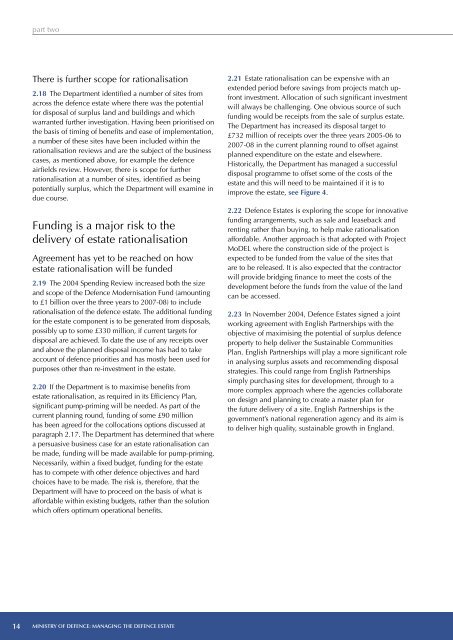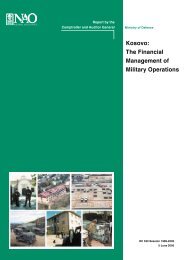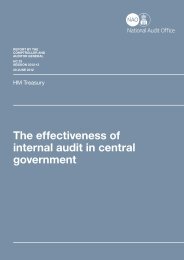Create successful ePaper yourself
Turn your PDF publications into a flip-book with our unique Google optimized e-Paper software.
part twoThere is further scope for rationalisation2.18 The Department identified a number of sites fromacross the defence estate where there was the potentialfor disposal of surplus land and buildings and whichwarranted further investigation. Having been prioritised onthe basis of timing of benefits and ease of implementation,a number of these sites have been included within therationalisation reviews and are the subject of the businesscases, as mentioned above, for example the defenceairfields review. However, there is scope for furtherrationalisation at a number of sites, identified as beingpotentially surplus, which the Department will examine indue course.Funding is a major risk to thedelivery of estate rationalisationAgreement has yet to be reached on howestate rationalisation will be funded2.19 The 2004 Spending Review increased both the sizeand scope of the Defence Modernisation Fund (amountingto £1 billion over the three years to 2007-08) to includerationalisation of the defence estate. The additional fundingfor the estate component is to be generated from disposals,possibly up to some £330 million, if current targets fordisposal are achieved. To date the use of any receipts overand above the planned disposal income has had to takeaccount of defence priorities and has mostly been used forpurposes other than re-investment in the estate.2.20 If the Department is to maximise benefits fromestate rationalisation, as required in its Efficiency Plan,significant pump-priming will be needed. As part of thecurrent planning round, funding of some £90 millionhas been agreed for the collocations options discussed atparagraph 2.17. The Department has determined that wherea persuasive business case for an estate rationalisation canbe made, funding will be made available for pump-priming.Necessarily, within a fixed budget, funding for the estatehas to compete with other defence objectives and hardchoices have to be made. The risk is, therefore, that theDepartment will have to proceed on the basis of what isaffordable within existing budgets, rather than the solutionwhich offers optimum operational benefits.2.21 Estate rationalisation can be expensive with anextended period before savings from projects match upfrontinvestment. Allocation of such significant investmentwill always be challenging. One obvious source of suchfunding would be receipts from the sale of surplus estate.The Department has increased its disposal target to£732 million of receipts over the three years 2005-06 to2007-08 in the current planning round to offset againstplanned expenditure on the estate and elsewhere.Historically, the Department has managed a successfuldisposal programme to offset some of the costs of theestate and this will need to be maintained if it is toimprove the estate, see Figure 4.2.22 Defence Estates is exploring the scope for innovativefunding arrangements, such as sale and leaseback andrenting rather than buying, to help make rationalisationaffordable. Another approach is that adopted with ProjectMoDEL where the construction side of the project isexpected to be funded from the value of the sites thatare to be released. It is also expected that the contractorwill provide bridging finance to meet the costs of thedevelopment before the funds from the value of the landcan be accessed.2.23 In November 2004, Defence Estates signed a jointworking agreement with English Partnerships with theobjective of maximising the potential of surplus defenceproperty to help deliver the Sustainable CommunitiesPlan. English Partnerships will play a more significant rolein analysing surplus assets and recommending disposalstrategies. This could range from English Partnershipssimply purchasing sites for development, through to amore complex approach where the agencies collaborateon design and planning to create a master plan forthe future delivery of a site. English Partnerships is thegovernment’s national regeneration agency and its aim isto deliver high quality, sustainable growth in England.14MINISTRY OF DEFENCE: MANAGING THE DEFENCE ESTATE
















